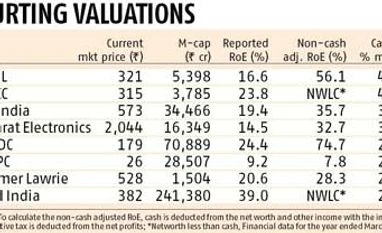Many of these companies are potentially running their business without any investment, considering the cash and bank balances are higher than their net worth. For instance, Coal India’s FY13 net worth was Rs 48,472 crore, while its cash and bank balance stood at Rs 62,236 crore. The case is similar for construction company NBCC, which undertakes projects on behalf of the government.
“Keeping money in the bank is the dumbest thing to do. But PSUs are not alone; there are many private sector companies that are hoarding cash. I think many of these PSUs have a huge opportunity and can deploy this money in businesses that inherently have high RoEs, as and when the environment improves,” said U R Bhat, managing director, Dalton Capital Advisors.
Many experts agree. “The underlying objective of a company is to create shareholder wealth. You do not do this by locking (money) for years in investments that yield 8-10 per cent. That is not what a company is founded for. Firms can invest in core business that yield high returns or diversify. If not, they should give to shareholders higher payouts and let shareholders take the risk,” says Gaurav Parikh, managing director, Jeena Scriptech Alpha Advisors.
“PSUs aren’t worried about valuations. They are not run for valuations, compared to private players who might try to milk their valuations through distribution of cash (dividends) or buybacks. This, to an extent, shows why despite good fundamentals, some PSUs continue to trade at low valuations compared to their private peers,” said Abhishek Asthana, executive director of deANALYST, a financial research company.
Apart from paying dividend, PSUs can create value through buyback of shares, but only if the situation is attractive. “Buyback only makes sense when you are running out of any idea to deploy funds, which can create shareholder value by way of generating higher returns,” said U R Bhat.
In the recent past, NHPC, despite the nature of its business, which requires huge equity and debt (to set up hydro power projects), announced plans to use surplus cash to buy back shares. At the time of the announcement, its shares were being traded at just 0.6 time its book value and seven times (PE) its earnings, based on FY15 estimates. Theoretically, seven times PE means an earnings yield of 14 per cent, 400 basis points higher than the rate on bank fixed deposits. Experts say this route is good for firms unable to deploy surplus cash in high-RoE businesses.
“I think for companies in the PSU space that do not have reinvestment opportunities, the next best thing is to buy back shares, particularly at the time when stocks trade significantly below their intrinsic value. This is true in many cases such as NMDC, Coal India, Bharat Electronics and NBCC, where a buyback could have been actually considered. However, at times, it is difficult for PSUs to take a call on the markets and prices and the safest thing is to sit on the cash,” said Vikas Gupta, fund manager at Arthveda Fund Management.
One obstacle in the buyback route could be the high promoter stake in these companies, the reason why the government is considering divesting shares to meet Securities and Exchange Board of India’s mandate of at least 25 per cent public holding.
In the recent past, hopes of better management under Prime Minister Modi and of an economic recovery have seen PSU stocks outperform markets. If these are unable to live up to expectations and start generating higher returns, the markets are likely to be disappointed.
)